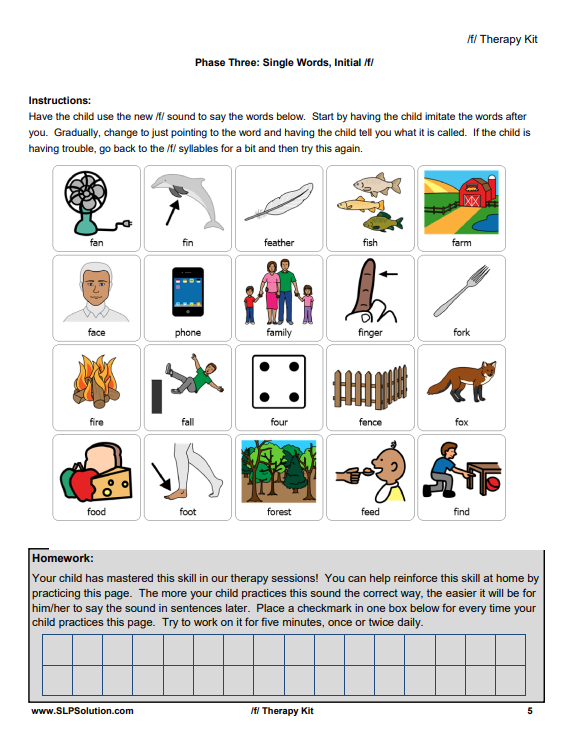/f/ Sound Speech Therapy:
How to Help Children Learn to Say the /f/ Sound
Some children struggle to say the /f/ sound in conversational speech. We don’t typically start working on the /f/ sound in therapy until a child is 4-5 years old as many children still struggle with the sound before that age and will fix it on their own as they get older.
This page will show you how to use an articulation approach to help a child say the /f/ sound correctly. That means you will start by teaching the child to say the sound by itself, like “ffff”, then you work on the sound in syllables, like “fuh, foh, foo”. After that, you work on the sound in single words like “fan, fix, off”, phrases , and then sentences. Once you’ve done all that, then you work on helping your child say the sound in conversational speech.
How to Teach the /f/ Sound:
Download the Handouts for Free:
You can download the entire /f/ home program by clicking this button:
Breakdown of How to Teach the /f/ Sound in Speech Therapy:
- /f/ in Isolation: Student will produce the /f/ sound in isolation (by itself, not in a word or with other sounds)
- /f/ in Syllables: Student will produce the /f/ sound in non-sense syllables
- /f/ in Words: Student will produce the /f/ sound in all positions of single words (beginning of the word, middle of the word, and end of the word)
- /f/ in Phrases: Student will produce the /f/ sound in all word positions of 2-3 word phrases
- /f/ in Sentences: Student will produce the /f/ sound in all word positions of simple sentences
What’s Next?
- At this point, you can either move on to work on another speech sound and see if this sound generalizes on its own. Or, you can move on to our “carry-over and generalization” kit with this sound.
Sample IEP Goal for the /f/ Sound:
Student will produce the /f/ sound in all word positions in sentences in the therapy environment with at least 80% accuracy.

About the Author: Carrie Clark, MA CCC-SLP
Hi, I’m Carrie! I’m a speech-language pathologist from Columbia, Missouri, USA. I’ve worked with children and teenagers of all ages in schools, preschools, and even my own private practice. I love digging through the research on speech and language topics and breaking it down into step-by-step plans for my followers.
Connect with Me:







I am working with a child on initial /f/. In spontaneous conversation, she substitutes /b/. With cues, she can produce initial /f/ in single words. However, it does not sound natural. There is a gap between /f/ and the rest of the word. I have her trace a rainbow to hold out the /f/ sound. I verbally cue her to “keep her voice on,” “keep pushing the air out,” and “hold out /f/.” She can do a natural /f/ while tracing the rainbow but is very inconsistent and continues to rely on the rainbow visual. I’ve also done auditory discrimination where she judges my /f/ productions as correct or incorrect (i.e., with the gap). She can usually discriminate correct/incorrect correctly. We have been working on producing initial /f/ for at least a month with little progress. Do you have any suggestions?
Oh man, that’s tough! I can’t tell you specifically what to do with that child since I don’t know her but I can tell you some of the things I’ve tried when I’ve had a child who was stuck on a sound or having trouble putting the sound together without gaps:
1. Try working on the sound in another word position for a while
2. Try giving that sound a break and working on a different sound for a bit and coming back to it
3. Go back to the syllable level and practice saying the sound just with one vowel in a non-sense syllable, like “fuh, foh, foo”
I hope one of those helps you!
Hi there,
I have a child stopping producing /b/ instead of /f/ we have finally after a lot of practise got /f/ in isolation.
I am trying for /f/ and schwa sound which she finds hard but I think did 1-2 out of 10 tries but Consonant Vowel words turn into f-bee, f-bay, f-bi,-f-boo etc….
I have sent her mum home today with a pack for prastising in isolation but a little stuck where to go next if she can’t get CV.
Any advice would be helpful!
The more times you practice that sound in isolation, the easier it should get. And eventually, she should be able to say it with a vowel! I usually have them keep practicing isolation at home to solidify the brain pathway for that sound and we work on different elicitation techniques in therapy to try to get the CV or VC.
Hi, I am a teacher and currently have a child who pronounces all /a/ as /e/, so pan is pronounced as pen.
I have searched google but this doesn’t seem to be a common issue. He also sometimes confuses /u/ with /e/, so umbrella is pronounced embrella.
I have tried to model the correct sound but I will over-exaggerate the /a/ and he will try his best but just repeat /e/. It is as if he doesn’t possess that sound.
Any tips? What are the mouth tongue position differences between /e/ and /a/?
Correcting vowels is very tricky. I would highly recommend seeing if the school speech-language pathologist can help with that one!
excellent submit, very informative. I ponder why the other specialists of this sector don’t realize this.
You should continue your writing. I’m sure, you’ve a
huge readers’ base already!
we too have a child who can not pronounce the middle vowel sound correctly and this child has dyspraxia. Worth checking out!
Hi there,
Im working with a child with Initial Consonant Deletion. He can say f medially and finally, but he can’t produce the initial /f/ in a word. I also really struggle to get him to make the sound on its own! As he is only three, he often gets upset and disengaged the minute he can’t do it. Do you have any suggestions for teaching him the f sound in the initial word position? its so hard and he is so young so doing things like the spider for “fi fa fo” is too complex for him!
Hi, Kat-
You can try this link out!
Just started working with a 6 year old lower SDC child who has an articulation goal of producing the /f/. Autistic and has no cognitive interaction with me. Often in the session i had to re-direct him just to look at me. He would not imitate me biting my lip, blowing air with his upper teeth even in close proximity to my lower lip. He is will also resist my efforts to bring his lower lip up to his teeth and pull away.
I’m looking for any suggestions to help him even approximate the upper teeth on his lower lip as a start.
Hello guys! I need your help i am working with a child on the sound /f/. He can say it now in isolation but cant pronounce it in syllables. He says /fka/ instead of /fa/. I need some tips plzz!!
So far, for kids who can say final /f/ , but stop /f/ in initial position with (b,p, etc) , I use reduplicated syllables /afafaf/ olaf! So I trick them into saying the initial f on the back end of the first syllable. I also like using /f/+ an /h/ initial word to try blend the sounds together, ie /f/+ honey= funny. I call it Math for your mouth. If you can get a finger on their upper lip, Still Upper Lip, to freeze their lip from closing on the fricative /f/. Hope this helps someone someday!
I’m grateful to have found this resource, as it provides me with the necessary tools and strategies to help my child overcome this challenge and improve their overall speech and communication skills.
I’m so glad to hear that our resources have been a help to you and your child! Please let us know how we can help in the future.
Have a 6 year old autistic girl. She can say all her sounds and one of words are super clear. When she says anything more than 2 words it becomes baby babble and we have no idea what she’s saying. We’ve tried getting her to slow down, think about sounds etc but she’s getting harder to understand as she gets older. Any tips or tricks please?
Hey there! I’m sorry to hear that you guys are struggling with understanding your daughter! And I’m sorry it took me a while to respond. We’ve been moving so everything has been super hectic!
Is your daughter currently receiving speech therapy at her school? Since I haven’t worked with your daughter directly, I can’t say what will be the best approach for her. There are a lot of different ways to help a child speak more clearly. But if she already has a speech therapist who can give you some ideas, I can point you toward resources that might be helpful for home practice.
If a child in not pronouncing the /f/ sound correctly in it’s initial days then it’s normal, but if the child is struggling with it in it’s 5 or 6 years then it’s a problem. Parents should practice with the child and with pronunciations in their daily routine for overcome the difficulties.
Great ideas!